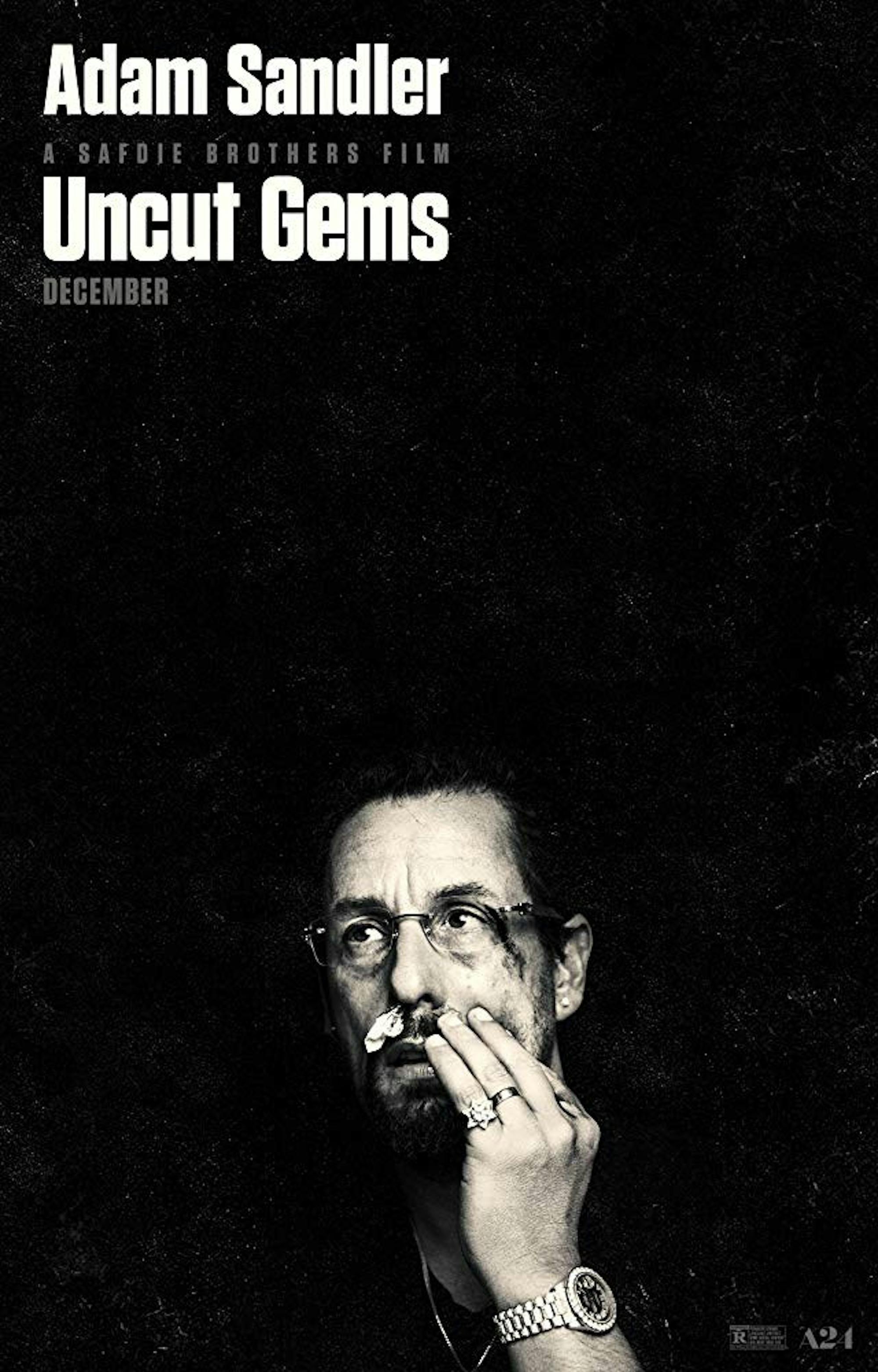A well-established modern aphorism is that human civilization has attained unprecedented levels of connectivity and that, accordingly, everyday life flies by at a blistering clip. Things get worse if you consume news on even a semi-regular basis, as that probably means you spend a not-insignificant portion of your conscious (and likely unconscious) time feeling like the whole world is falling over and over. In a word, these are anxious times.
Seeing and undoubtedly acutely feeling this, the Safdie brothers present us with a folk tale for our late-capitalist times. “Uncut Gems” (2019) is a beautiful emergency, centering on a gambling-addicted Jewish jeweler in New York’s Diamond District: Howard Ratner (Adam Sandler). This casting choice is as wonderful as it is bold. Sandler draws on the many goofy (at best) and grotesque (at worst) roles many of us associate him with, creating a man of gross excess who is surprisingly sympathetic (albeit sometimes verging on pathetic) and even endearing. The risk-averse might cringe at Ratner’s gambling to pay his debts, but his ambition and sheer hustle are bound to be just as entrancing, and it is these traits that leave us rooting for his bets to hit.
The depth of Ratner’s infinite want is reflected in the titular uncut gem he acquires, an Ethiopian black opal. The opal’s beauty is evident from when we first set eyes on it. The camera zooms in on one of its iridescent nodes until the audience finds itself swimming through the nebulae within, a sprawling universe of color and textures.
Its charms are not lost on Ratner nor on then-Celtics star Kevin Garnett, who plays himself. Garnett is brought to Ratner’s shop by Demany (LaKeith Stanfield), Ratner’s associate, in the hopes of selling him some of Ratner’s regular stock, an idea abandoned once Garnett is shown the opal. Looking into it, Garnett glimpses some long and rich history, perhaps his own, rushing toward him out from the firmament within. He is enraptured by this vision, telling Ratner that the gem makes him feel superhuman and, accordingly, that he feels like he must have it.
The gem becomes central to both Garnett’s and Ratner’s stories; Garnett needs it to win on the court and Ratner needs it to pay his debts. Ratner’s reluctant agreement to temporarily give the gem to Garnett sets off a long, anxiety-inducing tumble, which never truly comes to a halt but does neatly entwine their fates and unexpectedly, the fates of those around them. Among these others are Ratner’s wife, Dinah (Idina Menzel) and his girlfriend, Julia, played by first-time actress Julia Fox, both of whom provide superb performances.
The visual spectacle of “Uncut Gems” is as engrossing as its narrative. Simply put, the sights on offer are sublime. The aforementioned dives into the opal’s rich and spacious interior contrast well with the cool-toned and kinetic claustrophobia of much of the rest of the film. The same images which dazzle tend to overwhelm and give rise to anxiety, as each scene with more than two people teems with errant activity and noise. The original soundtrack for the movie, created by Daniel Lopatin of Oneohtrix Point Never fame, toes the same line as the visuals. Lopatin’s music is positively enchanted and enchanting, replete with vistas of dancing synth tones and woodwinds and exultant vocal chants. The visual, audible and narrative aspects of the film are masterfully joined, all exemplary and united in purpose.
That purpose is the creation of the aforementioned late-capitalist folk tale. The relevance of Ratner’s story to our moment goes beyond the film’s dominant mood of anxiety. In fact, many of us share unexpected similarities with Ratner: we do not really own anything and yet find ourselves owing more and more; we live in a world where terror and remarkable beauty coexist; we seek to succeed, to win, in the face of issues and systems which often literally blot out the light of the sky. The line which is the subject of many “Uncut Gems” memes is also one of its most moving; “This is how I win” carries a delightful energy, at once playful and obdurate. To see Ratner’s declaration as one of hubris is dull cynicism, a sentiment our world is increasingly unable to afford.
The ballad of Howard Ratner is an ode to persistence in all its forms. Finding himself caught between fear and ruin, Ratner raises the stakes. He insists on doing things his way, because, for him, the alternative is unimaginable.
'Uncut Gems' transfixes, shows desire run amok

A promotional poster for "Uncut Gems" (2019) is pictured.
Summary
“Uncut Gems” stuns in all aspects, creating a story as beautiful as it is pertinent to the present moment we live in.
5 Stars





